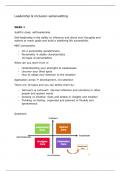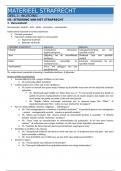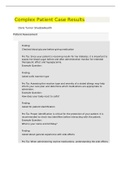Resume
Samenvatting - Leadership & Inclusion
- Cours
- Leadership & Inclusion
- Établissement
- Arteveldehogeschool (Artevelde)
Dit bevat alle stof van de module Leadership & Inclusion, wel exclusief de guest lectures van dit jaar. Voor de rest bevat het alle stof van de 4 verschillende onderwerpen die de 4 docenten hebben gegeven, hierop is het ook zo geordend per week. Het bevat dus de; DEI, self-leadership, coaching en ...
[Montrer plus]





